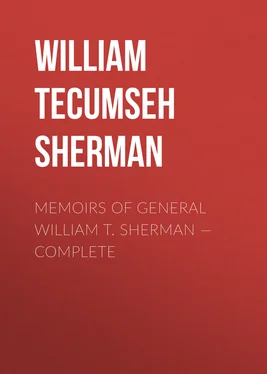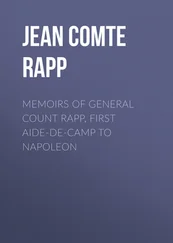William Tecumseh Sherman - Memoirs of General William T. Sherman — Complete
Здесь есть возможность читать онлайн «William Tecumseh Sherman - Memoirs of General William T. Sherman — Complete» — ознакомительный отрывок электронной книги совершенно бесплатно, а после прочтения отрывка купить полную версию. В некоторых случаях можно слушать аудио, скачать через торрент в формате fb2 и присутствует краткое содержание. Жанр: Биографии и Мемуары, История, foreign_edu, foreign_antique, foreign_prose, на английском языке. Описание произведения, (предисловие) а так же отзывы посетителей доступны на портале библиотеки ЛибКат.
- Название:Memoirs of General William T. Sherman — Complete
- Автор:
- Жанр:
- Год:неизвестен
- ISBN:нет данных
- Рейтинг книги:4 / 5. Голосов: 1
-
Избранное:Добавить в избранное
- Отзывы:
-
Ваша оценка:
- 80
- 1
- 2
- 3
- 4
- 5
Memoirs of General William T. Sherman — Complete: краткое содержание, описание и аннотация
Предлагаем к чтению аннотацию, описание, краткое содержание или предисловие (зависит от того, что написал сам автор книги «Memoirs of General William T. Sherman — Complete»). Если вы не нашли необходимую информацию о книге — напишите в комментариях, мы постараемся отыскать её.
Memoirs of General William T. Sherman — Complete — читать онлайн ознакомительный отрывок
Ниже представлен текст книги, разбитый по страницам. Система сохранения места последней прочитанной страницы, позволяет с удобством читать онлайн бесплатно книгу «Memoirs of General William T. Sherman — Complete», без необходимости каждый раз заново искать на чём Вы остановились. Поставьте закладку, и сможете в любой момент перейти на страницу, на которой закончили чтение.
Интервал:
Закладка:
As there was very little to do, General Smith encouraged us to go into any business that would enable us to make money. R. P. Hammond, James Blair, and I, made a contract to survey for Colonel J. D. Stevenson his newly-projected city of "New York of the Pacific," situated at the month of the San Joaquin River. The contract embraced, also, the making of soundings and the marking out of a channel through Suisun Bay. We hired, in San Francisco, a small metallic boat, with a sail, laid in some stores, and proceeded to the United States ship Ohio, anchored at Saucelito, where we borrowed a sailor-boy and lead-lines with which to sound the channel. We sailed up to Benicia, and, at General Smith's request, we surveyed and marked the line dividing the city of Benicia from the government reserve. We then sounded the bay back and forth, and staked out the best channel up Suisun Bay, from which Blair made out sailing directions. We then made the preliminary surveys of the city of "New York of the Pacific," all of which were duly plotted; and for this work we each received from Stevenson five hundred dollars and ten or fifteen lots. I sold enough lots to make up another five hundred dollars, and let the balance go; for the city of "New York of the Pacific" never came to any thing. Indeed, cities at the time were being projected by speculators all round the bay and all over the country.
While we were surveying at "New York of the Pacific," occurred one of those little events that showed the force of the gold-fever. We had a sailor-boy with us, about seventeen years old, who cooked our meals and helped work the boat. Onshore, we had the sail spread so as to shelter us against the wind and dew. One morning I awoke about daylight, and looked out to see if our sailor-boy was at work getting breakfast; but he was not at the fire at all. Getting up, I discovered that he had converted a tule-bolsa into a sail boat, and was sailing for the gold-mines. He was astride this bolsa, with a small parcel of bread and meat done up in a piece of cloth; another piece of cloth, such as we used for making our signal-stations, he had fixed into a sail; and with a paddle he was directing his precarious craft right out into the broad bay, to follow the general direction of the schooners and boats that he knew were ascending the Sacramento River. He was about a hundred yards from the shore. I jerked up my gun, and hailed him to come back. After a moment's hesitation, he let go his sheet and began to paddle back. This bolsa was nothing but a bundle of tule, or bullrush, bound together with grass-ropes in the shape of a cigar, about ten feet long and about two feet through the butt. With these the California Indiana cross streams of considerable size. When he came ashore, I gave him a good overhauling for attempting to desert, and put him to work getting breakfast. In due time we returned him to his ship, the Ohio. Subsequently, I made a bargain with Mr. Hartnell to survey his ranch at Cosnmnes River, Sacramento Valley. Ord and a young citizen, named Seton, were associated with me in this. I bought of Rodman M. Price a surveyor's compass, chain, etc., and, in San Francisco, a small wagon and harness. Availing ourselves of a schooner, chartered to carry Major Miller and two companies of the Second Infantry from San Francisco to Stockton, we got up to our destination at little cost. I recall an occurrence that happened when the schooner was anchored in Carquinez Straits, opposite the soldiers' camp on shore. We were waiting for daylight and a fair wind; the schooner lay anchored at an ebb-tide, and about daylight Ord and I had gone ashore for something. Just as we were pulling off from shore, we heard the loud shouts of the men, and saw them all running down toward the water. Our attention thus drawn, we saw something swimming in the water, and pulled toward it, thinking it a coyote; but we soon recognized a large grizzly bear, swimming directly across the channel. Not having any weapon, we hurriedly pulled for the schooner, calling out, as we neared it, "A bear! a bear!" It so happened that Major Miller was on deck, washing his face and hands. He ran rapidly to the bow of the vessel, took the musket from the hands of the sentinel, and fired at the bear, as he passed but a short distance ahead of the schooner. The bear rose, made a growl or howl, but continued his course. As we scrambled up the port-aide to get our guns, the mate, with a crew, happened to have a boat on the starboard-aide, and, armed only with a hatchet, they pulled up alongside the bear, and the mate struck him in the head with the hatchet. The bear turned, tried to get into the boat, but the mate struck his claws with repeated blows, and made him let go. After several passes with him, the mate actually killed the bear, got a rope round him, and towed him alongside the schooner, where he was hoisted on deck. The carcass weighed over six hundred pounds. It was found that Major Miller's shot had struck the bear in the lower jaw, and thus disabled him. Had it not been for this, the bear would certainly have upset the boat and drowned all in it. As it was, however, his meat served us a good turn in our trip up to Stockton. At Stockton we disembarked our wagon, provisions, and instruments. There I bought two fine mules at three hundred dollars each, and we hitched up and started for the Coaumnes River. About twelve miles off was the Mokelumne, a wide, bold stream, with a canoe as a ferry-boat. We took our wagon to pieces, and ferried it and its contents across, and then drove our mules into the water. In crossing, one mule became entangled in the rope of the other, and for a time we thought he was a gone mule; but at last he revived and we hitched up. The mules were both pack-animals; neither had ever before seen a wagon. Young Seton also was about as green, and had never handled a mule. We put on the harness, and began to hitch them in, when one of the mules turned his head, saw the wagon, and started. We held on tight, but the beast did not stop until he had shivered the tongue-pole into a dozen fragments. The fact was, that Seton had hitched the traces before he had put on the blind-bridle. There was considerable swearing done, but that would not mend the pole. There was no place nearer than Sutter's Fort to repair damages, so we were put to our wits' end. We first sent back a mile or so, and bought a raw-hide. Gathering up the fragments of the pole and cutting the hide into strips, we finished it in the rudest manner. As long as the hide was green, the pole was very shaky; but gradually the sun dried the hide, tightened it, and the pole actually held for about a month. This cost us nearly a day of delay; but, when damages were repaired, we harnessed up again, and reached the crossing of the Cosumnes, where our survey was to begin. The expediente, or title-papers, of the ranch described it as containing nine or eleven leagues on the Cosumnes, south side, and between the San Joaquin River and Sierra Nevada Mountains. We began at the place where the road crosses the Cosumnes, and laid down a line four miles south, perpendicular to the general direction of the stream; then, surveying up the stream, we marked each mile so as to admit of a subdivision of one mile by four. The land was dry and very poor, with the exception of here and there some small pieces of bottom land, the great bulk of the bottom-land occurring on the north side of the stream. We continued the survey up some twenty miles into the hills above the mill of Dailor and Sheldon. It took about a month to make this survey, which, when finished, was duly plotted; and for it we received one-tenth of the land, or two subdivisions. Ord and I took the land, and we paid Seton for his labor in cash. By the sale of my share of the land, subsequently, I realized three thousand dollars. After finishing Hartnell's survey, we crossed over to Dailor's, and did some work for him at five hundred dollars a day for the party. Having finished our work on the Cosumnes, we proceeded to Sacramento, where Captain Sutter employed us to connect the survey of Sacramento City, made by Lieutenant Warner, and that of Sutterville, three miles below, which was then being surveyed by Lieutenant J. W. Davidson, of the First Dragoons. At Sutterville, the plateau of the Sacramento approached quite near the river, and it would have made a better site for a town than the low, submerged land where the city now stands; but it seems to be a law of growth that all natural advantages are disregarded wherever once business chooses a location. Old Sutter's embarcadero became Sacramento City, simply because it was the first point used for unloading boats for Sutter's Fort, just as the site for San Francisco was fixed by the use of Yerba Buena as the hide-landing for the Mission of "San Francisco de Asis."
Читать дальшеИнтервал:
Закладка:
Похожие книги на «Memoirs of General William T. Sherman — Complete»
Представляем Вашему вниманию похожие книги на «Memoirs of General William T. Sherman — Complete» списком для выбора. Мы отобрали схожую по названию и смыслу литературу в надежде предоставить читателям больше вариантов отыскать новые, интересные, ещё непрочитанные произведения.
Обсуждение, отзывы о книге «Memoirs of General William T. Sherman — Complete» и просто собственные мнения читателей. Оставьте ваши комментарии, напишите, что Вы думаете о произведении, его смысле или главных героях. Укажите что конкретно понравилось, а что нет, и почему Вы так считаете.












